Most people outside Europe (especially DJs) are amazed to hear about the limited choice of radio available in the UK prior to 1964. Before then, few UK radio listeners had heard a commercial on the radio, let alone a jingle...
By
the time Top Forty radio arrived in the UK, the Golden Age of American
radio was practically over. We didn't have much to listen to before
the advent of the offshore 'pirates'. The BBC did have a few pop programmes
on what was called 'The Light Programme'. Besides the Light Programme,
the BBC (later christened 'the Beeb' by Kenny Everett), had 'The Home
Service' (news and speech-based), 'The Third Programme' (highbrow classical
music and avant-garde drama) and 'The World Service' [which oddly
enough was barely audible in Britain, but was in the rest of the world!
– Chris]. In the early Sixties, teenagers were a relatively new concept and catering for their musical tastes was not considered a top priority by Beeb management. Pop music was regarded as merely a passing fad. However, one of the Beeb's greatest difficulties with regard
to playing records was 'needle-time', a regulation whereby
only a certain number of minutes of recorded music was permitted to
be played weekly. This was due to Musicians' Union agreements and the
fact that the BBC employed its own orchestras; playing recordings off
vinyl would have cut down on the need for BBC-employed musicians.
One of the week's highlights for many people - and not merely the teens – was 'Pick of the Pops',
a chart countdown show broadcast on the Light Programme, initially on Saturday
nights and then moved to Sunday afternoons. Before the pirates arrived,
you could go to a beach, a park or any other public place on a Sunday
and hear 'Pick of the Pops' without owning a radio! All the car radios
and portables would be tuned in and the show could be heard everywhere
you went. The presenter associated more than anyone else with 'Pick
of the Pops', was the late Alan 'Fluff' Freeman. Fluff made the programme
his own, coining catchphrases such as "Hi there, pop-pickers!"
The only worthwhile listening option that we discovered other than the BBC was Radio Luxembourg,
a commercial broadcaster with a very long history. The station output was transmitted
from the tiny country of Luxembourg every night on 208 metres Medium
Wave, but most of the shows were pre-recorded in London. I remember
my shock when I first encountered 'Luxy' at around the age of ten. (i.e.
circa 1960) I had never before heard a commercial on the radio! Once
I discovered a station that played pop music nightly, I tuned in every
single evening, like thousands of other pop-starved kids. At the earliest
opportunity, I acquired 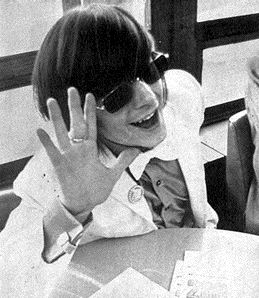 a cheap reel-to-reel tape machine to capture
the current hits and especially the American music being played on
Luxembourg.
a cheap reel-to-reel tape machine to capture
the current hits and especially the American music being played on
Luxembourg.
(Left: Tony Prince was on both Luxembourg and Caroline)
Reception was frequently very poor and the station inevitably faded into oblivion just as the DJ started spinning your current fave, faded back, went distorted and (if you were lucky) settled down for about thirty seconds, before the whole process started again! (Lucky Luxy will forever retain a place in radio history, because 'The Luxembourg Effect' became a recognised technical term for this form of reception artefact.) Maybe kids in the US encountered similar problems with XERB and the other stations that blasted over the border from Mexico?
Luxembourg programmes were sponsored by the major record companies, so a 'chart countdown' on 208 was likely to consist solely of the bestsellers on Decca, or on EMI. These shows normally featured only the first part of a song before it was faded by the DJ. The thinking behind this was 'leave 'em wanting more - if they like the bit they've heard they'll go and buy the single'. Some of the programmes were only 15 minutes long and all of the company's new releases had to be crammed into that time-slot. With the combination of fading out by the DJs and fading out with the 'Luxembourg Effect' you were lucky to hear 30 seconds of a song. Most singles were three minutes or less in duration in the first place!
Radio apart, kids would hang about for hours in record stores, standing
in booths to listen to the latest releases, till they got thrown out
for failing to buy anything. Or else they would spend every spare coin
feeding the local jukebox. My friends and I used to love it when the
travelling fair came to town. Apart from the exciting rides, we'd go
just to listen to the music. They always played terrific records, which
would slow down and gather speed again as the electrical generators
coped with power dips and surges when the rides started and stopped.
Most people living outside of Europe (especially DJs) are amazed to
hear about the limited choice of radio available in the UK prior to
1964 and the extraordinary hardships the pioneers had to endure in order
to bring the public the music it wanted! Unfortunately, in Ben Fong-Torres's
US-published book, 'The Hits Just Keep On Coming', the chapter on UK
pirate radio is very poorly researched and inaccurate and will have
failed to have enlightened any of its readers!
Imagine how astonished the remaining members of the wartime crew of
the USS Density were to discover that their minesweeper had not
been scrapped, (as they had been informed by the US Navy) but had lived
on to become a radio station! The sad thing is that they never knew
at the time that their ship was home to a station called Radio London
and was anchored three miles off the coast of Essex with the new ID
of 'Galaxy'.
There are many younger people in the UK who have never heard of Radio
London and are unaware of the history of how Britain came to have commercial
radio and jingles. This is unlikely to be taught in schools
as a significant aspect of social change in the Swinging Sixties, even
though it certainly was.
The following is a brief history of Radio London:
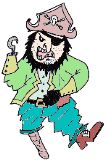 Radio
London broadcast from 16th December, 1964 (the first test transmissions)
to August 14th, 1967, from the mv Galaxy, anchored outside the
three-mile limit of British territorial waters. This was in order to
circumvent the country's stringent broadcasting laws; at the time, BBC
radio was the only station licensed to broadcast in the UK. The stations
were dubbed 'pirates' by the press, but because the stations were broadcasting
from International Waters, which are ungoverned by any laws, their operations
were never actually illegal. What they were 'pirating' was mediumwave
frequencies.
Radio
London broadcast from 16th December, 1964 (the first test transmissions)
to August 14th, 1967, from the mv Galaxy, anchored outside the
three-mile limit of British territorial waters. This was in order to
circumvent the country's stringent broadcasting laws; at the time, BBC
radio was the only station licensed to broadcast in the UK. The stations
were dubbed 'pirates' by the press, but because the stations were broadcasting
from International Waters, which are ungoverned by any laws, their operations
were never actually illegal. What they were 'pirating' was mediumwave
frequencies.
Radio London's backers were Texan businessmen, headed by the late Don
Pierson, who had been impressed when he read a newspaper article concerning
the success of Radio Caroline, Britain's first offshore pirate radio
station. It was June 1964, and Don, the town mayor of Eastland, Texas,
was well aware of the huge success of local radio station KLIF. He felt
it was time to introduce American Top 40-style radio to the UK, his
aim being to model the station output on that of KLIF, calling it 'KLIF
London'. Don's original idea was for the new station to broadcast tapes
of the KLIF output, with the local jingles replaced by specially-made
'KLIF London' jingles. However, Don had to modify his ideas somewhat.
The British public was totally unfamiliar with upbeat American radio,
and had so far never even heard a jingle. It was feared that this style
of broadcasting would not attract conservative British advertisers.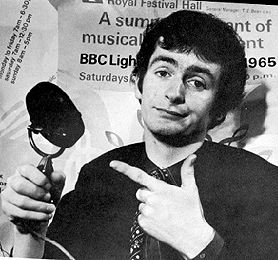
(Right: One of Radio London's original DJs, master of innovation, Kenny
Everett)
Another
Texan, Ben Toney, was brought in as Programme Director. Ben had worked
in the radio business for eight years, and was currently both sales
manager and DJ at WTAW in Bryan College Station. Radio London's jingles
were also recorded in Dallas, by PAMS, (Promotions, Advertising and
Merchandising Services) the top US jingle company at the time. Ben spent
some weeks in Dallas, overseeing production of a new set of PAMS Radio
London jingles, and consulting with KLIF's owner, Gordon McLendon and
his staff, to produce a station format for the new pirate station, similar
to KLIF's. To stay ahead of the four existing offshore pirates which
were currently broadcasting from forts and ships, Radio London would
become the first to carry news bulletins.
The backers searched for an appropriate ship to sail in Caroline's wake,
eventually purchasing the mv Density, a former US minesweeper.
They converted the ship for broadcasting use in Miami, renamed her the
Galaxy, and sailed her across the Atlantic Ocean to a new home;
an anchorage approximately three miles off Frinton-on-Sea, Essex. The
station's on-air name was agreed upon as Radio London – Big L,
just as KLIF Dallas was known as Big D. Ben Toney recruited DJs who
had gained on-air experience in Australia, Canada, Kenya and the USA.
When the station opened officially on December 23rd 1964, Canadian Pete Brady kicked off the very first broadcast with the following words: "Radio London is now on the air with its regular broadcasting schedule. This station will bring to Britain the very latest from Radio London’s top 40, along with up-to-date coverage of the news and weather. Radio London promises you the very best in modern radio".
Big
L's novice DJ was 19-year-old Liverpudlian, Kenny Everett. Ben Toney
immediately spotted star quality in Kenny's idiosyncratic raw talent,
and the nervous youngster evolved into one of the UK's greatest-ever,
and much-loved DJs.
Ben gave Kenny Everett and the more-experienced broadcaster, Dave Cash,
tapes of KLIF to listen to and emulate. When they heard the Charlie
and Harrigan show (at the time, 'Charlie' was Danny McCurdy – a
jock who had once worked for Ben – and 'Harrigan' was Ron Chapman),
Everett and Cash decided they would like to attempt a similar, zany
programme. In April 1965, the Kenny and Cash show was born. Within weeks,
this anarchic and hilarious programme achieved cult status, and changed
the face of UK radio for ever – copied, but never bettered. The
show was only on the air for a matter of months, but it has never been
forgotten. Rare recordings of it are treasured by air-check collectors.
Dave Cash says he is amazed at how people still talk to him about a
show that ran for such a short time, back in 1965!
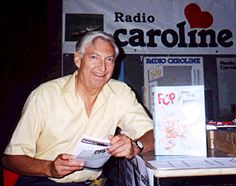 The
catchy PAMS jingles also achieved immediate popularity, and the station
went on to become the most successful of the British pirates. It was
Big L, and the influence of KLIF, that irrevocably changed British broadcasting.
The
catchy PAMS jingles also achieved immediate popularity, and the station
went on to become the most successful of the British pirates. It was
Big L, and the influence of KLIF, that irrevocably changed British broadcasting.
(Left: Keith Skues, pictured in August 2000, was on Caroline, London and Radio One. Oh, and also Luxembourg. Photograph - Pauline Miller)
When
a comparison is made, it quickly becomes apparent that the Big L Fab
Forties bear little resemblance to the sales-based charts of the time.
Radio London always tried to stay ahead of the game and by the time
a record had hit the top of the National Charts, it had usually been
dumped from the FF. It's the lesser-known singles from that era that
interest people the most. That is why the policy of our friends at the
Oldies Project
has always been to include as much material as possible that listeners
are unlikely to hear on their local 'Gold' station, with its boring,
repetitive playlist. (We know from first-hand experience that current
US radio is equally bad in that respect.) There were thousands of great
records released between the Fifties and the Seventies, so why is it
necessary for the audience to be bored rigid by a tedious little playlist?
Sadly there is now precious little radio that appeals to listeners who
enjoyed Big L back in the Sixties, which is why Oldies Project is proving
immensely popular.
In August 1967, the Wilson government's 'Marine etc., Offences Bill'
forced the closure of all but one of the pirate stations, Radio Caroline.
Its northern station broadcast from the mv Fredericia off the
Manx coastline and its southern ship was outside territorial waters
off the coast of Essex. Broadcasting from International waters could
not be made illegal, but working on the stations, supplying the ships
and advertising on the stations, could. There was a huge public campaign
to try and save offshore radio and the independently-governed Isle of
Man fought Westminster in an attempt to retain Caroline North. Most
of the stations ceased transmission on or before August 14th, 1967,
when the Marine Offences Bill became law at midnight.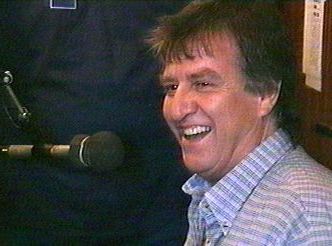
Radio
London closed at 3.00pm on August 14th. The day continues to be well-remembered
and commemorated amongst radio fans, few of whom are able to listen
to recordings of the station close-down without their emotions getting
the better of them.
(Right:
Ed 'Stewpot' Stewart began his career on Big L)
Caroline was the only offshore pirate that managed
to keep both her stations (south and north) broadcasting after the Marine
Offences Act was passed. Both Carolines hung on for a few months more,
by the skin of their teeth, serviced and supplied from Holland. Life
on board became increasingly difficult, and in March 1968, the two ships
were forcibly towed away to Amsterdam in retaliation for unpaid bills.
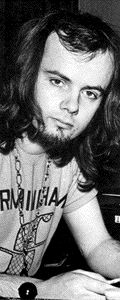 BBC
Radio One was launched in September '67 as the first national pop station,
and was intended to be a replacement for the much-lamented pirates.
A large percentage of the DJs on the newly-launched station were recruited
from Radio London, although it was always going to prove impossible
to recreate the atmosphere of being strapped down in a bucking studio
on the North Sea! DJs used to operating their own turntables found the
job was being performed by technical assistants. Radio One, still dogged
by 'needle-time' restrictions, was also required to share airtime with
the more formal Radio Two. The substitute for record-spinning was live
music. Embarrassing 'live house band' versions of Hendrix hits tended
to somewhat mar the station sound and its intended 'with-it' image.
The Beeb had a lot to learn.
BBC
Radio One was launched in September '67 as the first national pop station,
and was intended to be a replacement for the much-lamented pirates.
A large percentage of the DJs on the newly-launched station were recruited
from Radio London, although it was always going to prove impossible
to recreate the atmosphere of being strapped down in a bucking studio
on the North Sea! DJs used to operating their own turntables found the
job was being performed by technical assistants. Radio One, still dogged
by 'needle-time' restrictions, was also required to share airtime with
the more formal Radio Two. The substitute for record-spinning was live
music. Embarrassing 'live house band' versions of Hendrix hits tended
to somewhat mar the station sound and its intended 'with-it' image.
The Beeb had a lot to learn.
The first independent commercial radio stations did not launch till 1973
(Left:
Sony Golden Award-Winner 2002, the late John Peel. Famous for his 1967
Radio London programme 'The Perfumed Garden', arguably the most innovative
radio programme since Kenny and Cash in 1965)
Many of the country's top DJs, such as Ed Stewart,
Keith Skues and Tony Blackburn owed their careers to Radio London. Britain's
most innovative broadcaster ever and certainly one of the most successful
of all the Big L jocks, was the late Kenny Everett. Another innovative
Big L jock – the 2002 Sony Golden Award-winner, John Peel, was
still broadcasting on Radio One up until his untimely death in October
2004.
There is much more to the offshore radio story, which continued well
beyond the Sixties, but that's another saga for another day.
Mary Payne
Personal memories, summing-up the sadness of August 14th 1967 by David Skeates and Geoff Killick, are here.
Our report on the USS Density Reunion in Dallas, Sept 2001 is here in Branson, Missouri, Sept 2003, is here, in San Antonio, Texas, Sept 2008, is here.
DJ Bud Ballou's account of being aboard the Radio Caroline South ship as she was towed away, in March 1968, is here.
DJ Martin Kayne's account about the Radio Caroline North ship being towed away in March 1968 is here. The page includes a link to a newspaper report of the time regarding the two ships' overnight 'disappearance'.
A short section about Radio Luxembourg is on our website here.